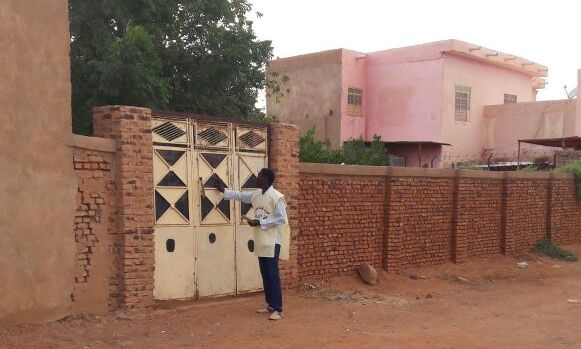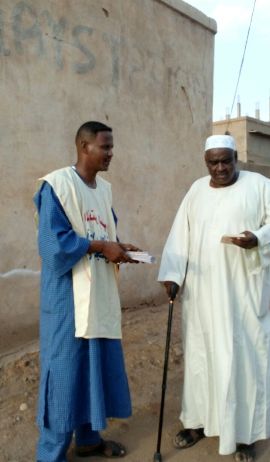The Postman: A new approach to avoid repression in Sudan

October 5, 2016 (KHARTOUM) – To avoid restrictions imposed by the security oppressive authorities against its opponents and ban them to practice their political activities in public, Sudanese Congress Party (SCP) has launched a campaign in Sudanese capital, Khartoum and neighboring states to deliver its political message and conducting direct discussions with citizens in their homes.
The SCP was established in January 1986. It was first chaired by the former chief-justice Abdel-Mageed Imam who was succeeded by Ibrahim al-Skeikh and has recently elected al-Digair as its third president.
The left reformist party call for social justice and separation of religion and state. It also party believes that the peaceful transfer of power is the only way to stability and unity of the country.
In the recent months, the Party has challenged the ruling party of National Congress Party (NCP) and organized political activities in public and open places calling on the citizens to resist the regime and take to the streets in protest against the deterioration of living conditions at all levels.
Within the few month ago, the opposition party has created a campaign called “Postman” as an unconventional way designed to reach people and telling them about the party’s political message and holding with them direct discussions in their homes regarding the daily concerns of life, besides the economic and environmental issues.

SCoP deputy chairman, Khalid Omar, told Sudan Tribune that the from-house-to- house campaign was inspired by the idea of (The Postman) who delivers letters to families in their homes.
“We write a letter conveying the party’s views on some issues and topics, which carried by the party’s delegate”. Omer said, adding “Then direct chat is conducted between our postman and citizens about their point of views concerning the issues and problems facing them and the country”.
Omer pointed out that the idea is advanced comparison to the data distribution method where the recipient is engaging in a debate about his idea, explaining that the campaign (Postman), was launched in the Sudanese capital Khartoum which included most of its neighborhoods then moved to the other states, where it began at White Nile State in the city of Kosti and now on its way to reach other cities.
The deputy chairman explained that the campaign came in the framework of the search for creative tools to connect with the people in light of the restrictions on the political forces and the denial them exercise their political activities in open places, indicating that the idea was not the first of its kind for the party to reach out to the masses, but it was preceded by tools including speeches in the markets and in public transportation, confirming that the campaign, which was launched early last month, reached about five thousand families in Khartoum state.
“Our party makes constant evaluation to its tools communication with the people, we have used three tools to connect with the masses at one time,” he confirmed.
Sudan Tribune witnessed last Friday the campaign launch in Jabal Awliya locality, south of Khartoum, where the party distributed hundreds of letters in different locations.
According to a press release obtained by Sudan Tribune, the campaign found overwhelming response from the citizens, particularly regarding the environment issue where residents complain of muddy puddles left by the fall of this year, in addition to the accumulation of waste in neighborhoods which forced residents to dispose of it by burning and other unhealthy means.
Because of its peaceful and discreet character, the campaign is tolerated by the security agents as it preaches the party’s programme; calls for freedoms and justice and does not seek to mobilize the street against the regime.
Besides this educational approach, the opposition party holds spontaneous public meetings in the markets, bus stations and where people gather in the streets . The speakers in these meetings address punctual issues like corruption, government policy in education or health care etc.. But also they avoid matters like regime change or other themes that may anger the security service.
(ST)
